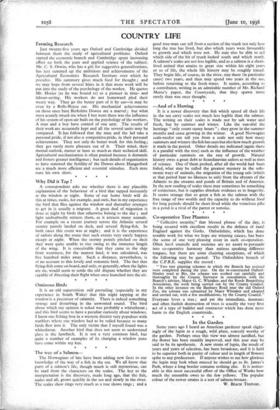COUNTRY LIFE
Farming Research Just twenty-five years ago Oxford and Cambridge divided between them the study of agricultural problems. Oxford started the economic branch and Cambridge spent increasing effort on both the pure and applied science of the subject. Mr. C. S. Orwin, who has a gift for suggestive generalisations, has just summed up the ambitions and achievements of the Agricultural Economies Research Institute over which he presides. His summary gives much food for thought ; and we may hope from several hints in it that more work will be put into the study of the psychology of the worker. He quotes Mr. Hosier (as he was bound to) as a pioneer in time- and labour-saving. His workers do not homeward plod their weary way. They go the better part of it by car—it may be even by a Rolls-Royce car. His mechanical achievements on those once bare Berkshire Downs are a marvel ; but what most acutely struck me when I last went there was the influence of his system of open-air bails on the psychology of the workers. A man and a boy have control of one unit. The results of their work are accurately kept and all the several units may be compared. It has followed that the man and the lad take a personal pride, if not also a competitive pride, in their personal achievement. They not only do better work for this feeling; they get vastly more pleasure out of it. Their mind, their mental outlook, matter at least as much as their technical skill. Agricultural mechanisation is often praised because it demands and fosters greater intelligence; but such details of organisation as have renewed the fertility of the Downs above Hungerford are a much more efficient and essential stimulus. Each man runs his own show.










































 Previous page
Previous page